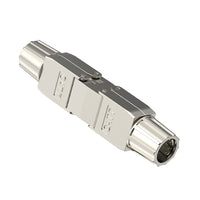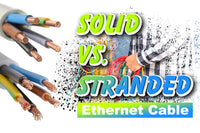Copper is often used for communication cables thanks to their superior electricity conductivity. If you are going to shop for a Cat5e or Cat6 Ethernet cable, you may find that they are available in copper clad aluminum cable and solid copper type. But which one is better? You might find yourself in a dilemma choosing between these two types of Ethernet cables because they are in a similar appearance. Take a moment to read the following article for more information about copper clad aluminum and solid copper in the realm of Ethernet cables.
What is Solid Copper Wire?
Solid copper wire, also known as pure copper cable, is the industry standard for Ethernet cables. Copper has been the first choice for cable conductors since the electric wiring system came into use in 1800. Copper outperforms other materials thanks to its low electrical resistance and great electricity conductivity. It can minimize signal loss and degradation during signal transmission.
What is CCA Cable?
CCA cable, short for copper clad aluminum, was first introduced to the Underwriters Laboratories for testing in the 1960s and then it appeared in NEC in 1971. CCA cable features a combination of an aluminum core with a copper coating. This copper-coated aluminum wire provides lightweight and low cost as well as electrical conductivity. It is considered a low-cost alternative to solid copper wire.
However, CCA cables can create more heat than solid copper wires, so they may cause damage in low-voltage and high-voltage wiring systems. Some Cat5e and Cat6 patch cables on the market may use CCA material in short-distance network connectivity.

Differences Between Solid Copper and CCA Cables
Solid copper wire and CCA have a very similar appearance, but they differ in many aspects. Understanding these differences can help you make a decision that best suits your requirements.
Mechanical Features: Copper-clad aluminum conductors are lighter and softer than pure copper wires. CCA cables are also more flexible than solid copper cables, but they are also easy to break or split due to the aluminum core. Solid copper features better ductile properties and added durability, and it requires less maintenance.
Electrical Performance: The solid copper has a relatively better conductivity than aluminum, meaning that the electricity can pass through easily with less resistance. Solid copper cable provides a high-speed and integrated signal with low loss while CCA cables may cause signal loss in long-distance transmission because of higher electrical resistance.
Durability: It is known that aluminum is easy to oxidize when exposed to air. So the CCA cables may cause termination failures in the network systems. Solid copper cables can be more durable than CCA cables.
Cost: Since the cable is calculated by length, CCA cables with the same length as solid copper cables are much lighter. So the installation and transportation cost of CCA cables can be lower than that of solid copper cables.
Safety: Solid copper is safer than CCA cables because the aluminum conductor can heat up faster than pure copper which may result in a fire hazard.
CCA vs. Solid Copper: Which One to Choose?
When selecting between CCA and solid copper cables, it is essential to weigh their pros and cons based on your specific needs. In general, solid copper cables are always the optimal option for network infrastructure, but CCA cables are not suitable for some applications.
CCA is not approved by the National Electrical Code (NEC) standard as it may cause fire hazards in low- or high-voltage applications CCA cables have higher DC resistance, making them not suitable for PoE applications. The poor bend radius makes them prone to breakage during the installation. CCA cables are also not suitable for long-distance network cabling due to their high data transmission attenuation. The longer the CCA cable, the slower the network.
The pure copper cables are resistant to corrosion and oxidation in the open air. It features a relatively high melting point and heat resistance. Solid copper cables outperform CCA cables in every aspect except the cost and are widely used in houses, offices, factories, and other buildings.
If you don’t require high-speed network transmission, or just need to connect your computer to the router over a short distance, and are budget-conscious, CCA patch cables can also be a good choice.
How Can I Distinguish If My Ethernet Cable is CCA?
So, how to check if your Ethernet cable is CCA or not? Here are some straightforward tips.
- Check out the Ethernet cable jacket. “CCA” is usually printed on the jacket by the manufacturers to help recognize CCA cables.
- But what if your cables have no specifications printed on the cable jacket? Cut and strip off the cable wire to see if the wire is pure copper or silver-colored aluminum core with a thin cladding of copper.
- Compare the weights of your cable and the solid cable. The aluminum can be lighter than copper so the CCA cable is much lighter than the solid copper cable.
- If you find the Ethernet cable is easy to break during the installation, you may get the CCA cable.
(Note: Copper clad steel (CCS) has a steel core coated with a layer of copper, similar to CCA cables. However, like CCA cables, CCS cables are also not a suitable substitute for solid copper cables. Though it has higher mechanical strength than solid copper cables, it will lead to issues during long-term use and can result in fire hazards.)
Final Thoughts
The solid copper Ethernet cable can be the best choice to ensure your network speed, stability, reliability, and security. Even though CCA cables can be more cost-effective, we don’t recommend them as they may compromise data and safety.
For more information on this topic, you can keep up on our blogs. While VCELINK offers general and basic information for our customers and other visitors to the website, it’s not professional advice.




Be the first one to comment.
Leave a comment